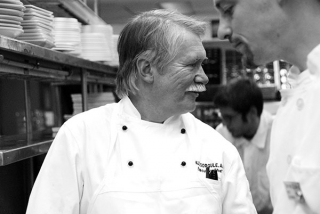
Measuring Competence and Confidence
30 April 2021Establish a student passport that compliments a degree or certificate and defines a specific skill’s baseline ability.
By Paul Sorgule, MS, AAC
At the core of every successful culinary program is measurable skill development. An appropriate analogy for a skill would be the difference between the process of cooking and becoming a cook. The transitional link between the two is competence and confidence. When a person has transitioned into being a cook then he or she has developed skills that can be applied with relative ease. If this is one of the most significant culinary program’s objectives, then how does one build toward its success and measure the program’s accomplishment of that objective?
Culinary programs attempt to expose students to a variety of understandings and applied skills such as: sanitation and nutrition, knife skills, foundational cooking methods, stock and sauce preparation, artistic plate presentations, menu planning, purchasing, cost controls, and the list goes on and on. If all goes as planned, the student will graduate as a “kitchen ready” employee with the competence and confidence to perform at an acceptable level.
If we look further into a typical curriculum sequence for measurable skills development at that “acceptable level,” it would be safe to say a few classes cover a few things. Some examples include: a few lessons on sauces, knife skills relegated to a few pounds of carrots or potatoes, a stab at filleting flat fish, or one shot at trimming a beef tender. These lessons do not lead to competence and confidence. The missing link is repetition. For a culinary program to truly prepare a student to be kitchen ready – it must include a significant amount of repeat work that focuses on improving quality and speed through the process.
How will a student build to a level of quality and speed with a tourne knife? Have them tourne 100 pounds of potatoes. How will a student learn to fillet a flat or round fish with proficiency, speed and minimal waste? Have them fillet a few dozen fish. How will a student become adept at shucking oysters? Give them a bushel or two to open. This is where internships, externships, or in-school restaurants fill the gap. A program without these complements will find it difficult to build the essential competence and confidence.
“You must have confidence in your competence.”
– Elijah Cummings
The assessment piece should be a cumulative evaluation against a level of competence and not just exposure. It would behoove program faculty members to establish some type of passport that defines the most critical specific skills and a standard level of competence for each. This passport can be a complement to the degree or certificate and serve as validation of baseline ability. A model such as this will show proof of competence and allow the graduate to feel a much higher level of confidence.
PLAN BETTER – TRAIN HARDER
Paul Sorgule, MS, AAC, president of Harvest America Ventures, a mobile restaurant incubator based in Saranac Lake, N.Y., is the former vice president of New England Culinary Institute and a former dean at Paul Smith’s College. Contact him at This email address is being protected from spambots. You need JavaScript enabled to view it..
